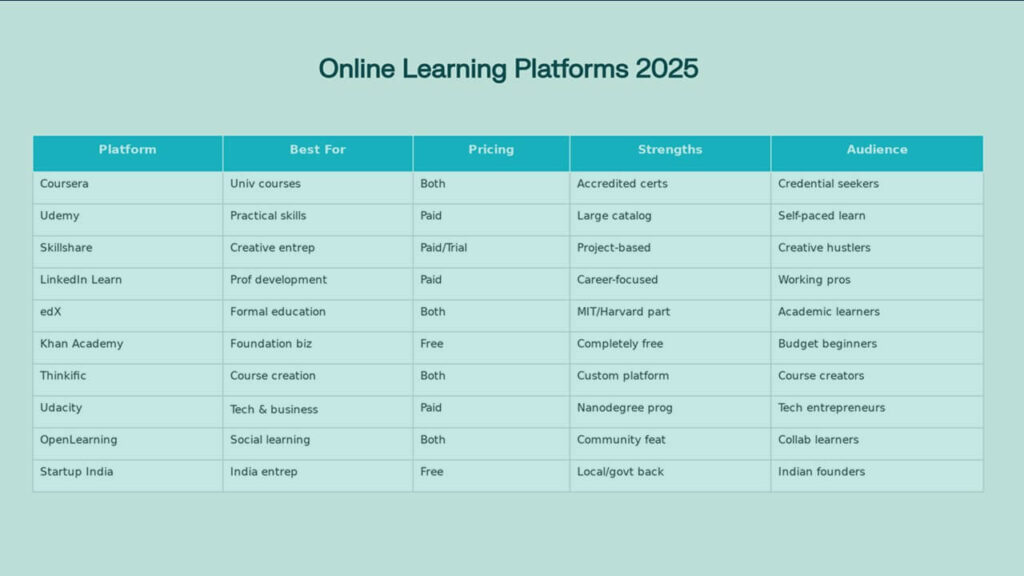The digital entrepreneurship landscape is evolving at breakneck speed, making continuous learning not just valuable—it’s absolutely essential for survival and success. Whether you’re launching your first side hustle, validating a business idea, or scaling an existing venture, knowing where to learn more online and choosing the right educational resources can mean the difference between costly mistakes and strategic wins. In today’s hyper-connected world, online learning platforms have democratized access to world-class business education, offering everything from free foundational courses to specialized nanodegree programs taught by industry leaders.
This comprehensive guide cuts through the noise to deliver actionable insights on the best platforms for business learning and online learning resources that will accelerate your entrepreneurial journey in 2025. From global powerhouses like Coursera and LinkedIn Learning to India-specific gems like Startup India’s free courses, we’ll explore where to find the most valuable content, how to maximize your learning ROI, and which communities will support your growth every step of the way.
Why Online Learning Matters for Entrepreneurs

Self-driven skill building has become the cornerstone of modern entrepreneurship. Unlike traditional business education that follows rigid curricula, online learning allows entrepreneurs to acquire specific skills exactly when they need them—whether that’s understanding conversion funnels before launching a marketing campaign or mastering financial modeling before approaching investors.
The entrepreneurial landscape changes rapidly, with new tools, platforms, and strategies emerging constantly. Online learning resources provide the agility to stay current with trends that could make or break your business. For instance, the rise of AI tools, changes in social media algorithms, or new e-commerce platforms require immediate upskilling that traditional education simply cannot provide.
Global and local learning integration offers entrepreneurs a unique advantage in 2025. While understanding universal business principles remains crucial, successful entrepreneurs also need deep knowledge of local markets, regulations, and cultural nuances. The best online learning strategies combine internationally recognized courses with region-specific content, creating a comprehensive educational foundation that works in real-world applications.
Top Online Course Platforms for Entrepreneurs (2025): Where to Learn More Online

University-Backed Powerhouses
Coursera continues to dominate the entrepreneurship courses online space with over 124 million learners worldwide. The platform’s strength lies in its partnerships with prestigious universities like Stanford, Yale, and Princeton, offering accredited certificates that carry real weight with investors and employers. For entrepreneurs, Coursera’s Wharton Entrepreneurship Specialization and courses like “Launch Your Online Business” provide structured learning paths that combine academic rigor with practical application.
edX, founded by MIT and Harvard, takes a more academic approach to business education. With over 4,000 courses, edX excels in providing free resources for entrepreneurs while offering paid verified certificates for those seeking formal recognition. The platform’s MicroMasters programs in business and entrepreneurship are particularly valuable for entrepreneurs looking to build credibility without pursuing a full MBA.
Practical Skill-Building Platforms
Udemy stands out for its vast catalog of over 210,000 courses across 13 different fields. For entrepreneurs, Udemy’s strength lies in its practical, hands-on approach to business skills. Courses like “Complete Digital Marketing Course” or “The Complete Financial Analyst Course” offer lifetime access and are frequently updated to reflect current market conditions. The platform’s pricing model, with courses ranging from $10-200, makes it accessible for bootstrapping entrepreneurs.
LinkedIn Learning has become essential for professional development, with over 16,000 courses focused on career growth and business skills. The platform’s integration with LinkedIn profiles allows entrepreneurs to showcase completed courses to their professional network, potentially attracting clients, partners, or investors. Courses on leadership, digital marketing, and business strategy are particularly valuable for entrepreneurs looking to build credibility in professional circles.
Creative and Project-Based Learning
Skillshare revolutionizes learning through its project-based approach, making it ideal for creative entrepreneurs and side hustlers. With over 35,000 courses focused on creative business skills, marketing, and entrepreneurship, Skillshare encourages learning by doing. The platform’s community features allow entrepreneurs to get feedback on real projects, making it particularly valuable for those in creative industries or developing consumer-facing products.
Thinkific serves a dual purpose—entrepreneurs can both learn from existing courses and create their own educational products. This makes it valuable for entrepreneurs looking to develop expertise while building potential revenue streams through course creation.
Best India-Specific and Local Resources

Startup India’s online courses represent one of the most comprehensive free resources for entrepreneurs specifically designed for the Indian market. The platform offers curated courses from prestigious institutions like IITs, covering essential topics from design thinking and accounting to data analytics and supply chain management. These courses are particularly valuable because they address India-specific regulatory, cultural, and market considerations that global platforms often overlook.
Seven Boats Academy has emerged as a leading digital marketing and entrepreneurship training institute in India. Their Digital Entrepreneurship Course costs just ₹15,000 for a 3-month program and focuses on practical skills for building online businesses in the Indian market. The academy’s approach combines digital marketing expertise with entrepreneurship training, making it ideal for entrepreneurs looking to build online ventures.
Unacademy, while primarily known for competitive exam preparation, has expanded significantly into business and entrepreneurship education. The platform offers courses in management, entrepreneurship, digital marketing, and business analytics, with many courses available in vernacular languages—crucial for reaching India’s diverse entrepreneurial ecosystem.
These India-specific platforms understand local challenges like regulatory compliance, payment gateway integration for Indian markets, and cultural considerations for product development and marketing. They also provide networking opportunities with fellow Indian entrepreneurs and mentors who have navigated similar challenges.
Top Resource Hubs & Business Templates

Bplans stands as the gold standard for business planning resources, offering over 550 business plan templates and comprehensive guides for entrepreneurs. The platform’s strength lies in its practical, actionable templates that entrepreneurs can immediately implement. From one-page business plans for early-stage startups to comprehensive funding proposals, Bplans provides the structural foundation that transforms ideas into investor-ready documents.
Inc.com‘s resource section curates high-quality content from successful entrepreneurs, industry experts, and business leaders. The platform excels at providing current, relevant advice on trending business topics, from AI integration to remote team management. Inc.’s “50 Best Websites for Entrepreneurs” has become a go-to resource guide, regularly updated to reflect the evolving digital landscape.
AllBusiness.com positions itself as a comprehensive resource hub for small business owners, offering everything from legal templates to marketing strategies. With over 159,000 members in its Ecommerce Experts group alone, the platform combines educational content with networking opportunities. AllBusiness particularly excels in providing practical templates for contracts, business plans, and operational procedures that entrepreneurs can immediately implement.
The Harvard Business Review’s online resources provide advanced strategic thinking tools for entrepreneurs ready to scale. While more academic than other resources, HBR’s case studies and frameworks help entrepreneurs think strategically about market positioning, competitive advantage, and long-term growth planning.
Entrepreneur Communities & Peer Learning

Indie Hackers has become the premier community for bootstrap entrepreneurs, with over 100,000 members sharing transparent revenue numbers, growth strategies, and lessons learned. The platform’s strength lies in its focus on profitable, sustainable businesses rather than venture-backed unicorns. Entrepreneurs can find accountability partners, validate ideas, and learn from detailed case studies of successful independent businesses.
LinkedIn Groups offer structured networking opportunities for entrepreneurs across different industries and expertise levels. Groups like “Startup Specialists Network” (986,000 members) and “Digital Marketing” (2.1 million members) provide access to industry experts, potential collaborators, and customers. The key to success on LinkedIn Groups is active participation—sharing insights, asking thoughtful questions, and building genuine relationships rather than just promoting your business.
OpenLearning’s community features create a social learning environment where entrepreneurs learn collaboratively. The platform’s focus on peer interaction and group projects makes it particularly valuable for entrepreneurs who thrive in collaborative environments and want to build their professional network while learning.
Reddit communities like r/Entrepreneur (1M members) and r/startups provide unfiltered, real-world advice from entrepreneurs at all stages. While the advice quality varies, Reddit’s voting system helps surface the most valuable insights. These communities are particularly valuable for getting honest feedback on ideas, products, and marketing strategies.
Getting the Most From Online Resources

Success with online learning resources requires strategic approach and consistent execution. Start with a skills audit—identify the specific knowledge gaps holding back your business growth. Rather than enrolling in random courses, create a learning roadmap that directly addresses your most pressing business challenges.
Free vs. paid course strategy should follow a systematic approach: use free courses to explore new topics and validate interest, then invest in paid courses for deep skill development in areas critical to your business success. For example, you might start with Khan Academy‘s free entrepreneurship content to understand basics, then invest in a comprehensive Udemy course on digital marketing once you’ve validated that marketing is your primary growth bottleneck.
Community engagement multiplies learning value. Join 1-2 communities aligned with your business focus rather than trying to participate in dozens. Share your learning journey, ask specific questions, and offer help to others. This approach transforms passive learning into active skill building while building valuable professional relationships.
Micro-learning and implementation cycles work better than marathon study sessions. Dedicate 30-60 minutes daily to learning, immediately followed by implementing one specific lesson in your business. This approach ensures knowledge retention and creates tangible business improvements from your learning investment.
7 Day Entrepreneur Learning Plan
Common Mistakes to Avoid

Resource overload represents the biggest trap for entrepreneur learners. The abundance of quality content can lead to endless course consumption without implementation. Limit yourself to 1-2 active learning platforms and complete courses before starting new ones. Your goal is skill development, not certificate collection.
Skipping free content evaluation before purchasing paid courses wastes money and time. Most platforms offer free trials, sample lessons, or free courses from the same instructors. Use these to evaluate teaching style, content quality, and practical relevance before investing in paid programs.
Ignoring instructor credentials and reviews leads to poor learning experiences. Research instructor backgrounds, read recent student reviews, and verify that course content is current. Entrepreneurship moves fast—courses older than 2-3 years may contain outdated strategies or tools.
Learning without application creates knowledge without capability. For every hour spent learning, plan to spend equal time implementing lessons in your business. Create specific implementation goals before starting any course to ensure practical value.
Action Plan: Your 7-Day Learning Sprint

This intensive 7-day learning plan balances exploration, skill building, and community engagement to jumpstart your entrepreneurial education journey. Each day focuses on specific learning objectives while building toward a comprehensive understanding of available resources and your personal learning preferences.
Days 1-2 focus on foundation building and platform exploration. Use this time to create accounts on key platforms, browse free content, and complete at least one foundational entrepreneurship course. This creates momentum and helps identify your preferred learning style and content focus areas.
Days 3-5 emphasize skill building in core business areas—marketing, finance, and digital tools. This practical focus ensures immediate applicability to current business challenges while building confidence in your ability to learn and implement new skills.
Days 6-7 transition to community engagement and action planning. Join entrepreneur communities, share your learning progress, and create concrete next steps for continuing your education beyond this sprint.
Taking Action: Your Next Steps
The entrepreneurial learning landscape in 2025 offers unprecedented opportunities for skill development and business growth. Success depends not on consuming more content, but on strategically selecting resources that directly address your business challenges and consistently implementing what you learn.
Start today by choosing one platform from our comparison guide and completing their introductory entrepreneurship course. Whether that’s Khan Academy‘s free content, Coursera‘s university partnerships, or India-specific resources from Startup India, the key is beginning your structured learning journey immediately.
Your learning investment should grow with your business. Bootstrap entrepreneurs should maximize free resources while investing selectively in paid courses that address critical skill gaps. As your business generates revenue, increase your learning budget proportionally—successful entrepreneurs typically invest 10-15% of their time in continuous learning.
Community engagement transforms solitary learning into collaborative growth. Join one entrepreneur community this week, introduce yourself, and share your learning goals. The relationships you build through shared learning experiences often become your most valuable business assets.
The difference between entrepreneurs who thrive and those who struggle isn’t access to information—it’s the discipline to learn continuously and implement consistently. Your entrepreneurial success starts with your commitment to systematic skill development. Choose your first learning resource, set aside dedicated study time, and begin building the knowledge foundation that will support your business dreams.
The tools, communities, and resources outlined in this guide provide everything needed to accelerate your entrepreneurial journey. The only remaining variable is your commitment to taking action. Start learning today—your future business success depends on the skills you build right now.
This article is part of our “Tools & Resources for New Online Entrepreneurs” content cluster, providing actionable insights to help you build and scale your digital business with confidence.
